20 Sep 2012
Day two at the Degrowth conference in Venice: Degrowth, or alternatives to development?
The theme of the first full day of ‘The Third International Conference on Degrowth for Ecological Sustainability and Social Equity’ in Venice was ‘Commons’. For me there were a couple of key highlights of the day, so I will give a thumbnail of all the talks today, but more detail on the highlights. As with my notes from yesterday, the following is compiled from my notes, and so are entirely fallible. Apologies to any of the speakers if I have got their message wrong. The first speaker was Gianni Tamino of the University of Padova who argued that in the context of depleting resources, the commons are essential for living, we can’t postpone the end of growth.
Collective ownership is our only way forward, because private property is leading to disaster. All renewable resources, he said, need to be considered as collective, we must fight against patents, and intellectual property. Our real wealth comes from our human relationships.
Next, Silke Helfrich of the Commons Strategies group gave an overaching take on her sense of what we mean by the commons. What people imagine as the commons, she said, are things like the air, the water, biodiversity, things not produced but given by nature. Then there’s things like language. Should we have to pay for a licence to speak Italian? Other things we imagine as commons are things that have been created to be given away.
Property is always about exclusion. Commons are tied to communities and networks. However, commons doesn’t mean that something belongs to no-one with no rules. Fairness means limited access for all. Elinor Ostrom said “commons work everywhere”. People communicate with each other, they negotiate, they establish rules, they are able to co-operate. Can we make institutions that make it easy to co-operate rather than compete?
One example of ‘commons-based peer production’. Here people set a goal together, set up rules and sanctions, contribute (voluntarily or by contract), and then there is possession instead of property. Commons work because they are user driven and socially rooted, we can make our own decisions in a socially shared process.
Next was Gustavo Soto from Bolivia. He talked about what is happening there, as the indigenous people fight to protect their commons. He spoke of how when Evo Morales came in there was great hope, but that he is now acting very differently. A part of the Amazon with protected status is being opened up to foreign multinationals to extract minerals and clear the forest and the local indigenous people are resisting.
Alberto Lucarelli of Frederico II University talked about, in the Italian context, the big push to privatise services and resources previously seen as common. He talked about the increased need for participatory democracy, and how the government is abusing its rights by selling public asset. What we need is a new dimension of democracy to ensure the commons, new powers of referenda to block these kinds of sell-offs, and the Italian constitution changes to prevent these assets being sold off.
Then, after a coffee break, it was workshop sessions. I went to one about co-housing, which was OK, but nothing I hadn’t heard before. So after lunch, rather than going to the second part of the workshop, I went for a big walk around Venice in the sunshine. Beautiful. Someone put a comment yesterday asking to see some photos of Venice, so here you go…
And all accompanied by the sounds of a completely car-free city. Now there’s a treat. I got back to the venue in time for the last plenary session of the day. The first speaker was Artuto Escobar of the University of North Carolina. I have to say, his talk was the most insightful of the day for me. I hope also to interview him while I am here for Transition Culture. His talk looked at how Degrowth looks different in the global North and the global South, and had some interesting insights for the Transition movement.
His theme was ‘Transition politics’. How can we link debates about degrowth with debates on alternatives to development in the global South? In the global North we have Degrowth, which is about post carbon, post materialism, post economic, post capitalist approaches. In the South, the focus is more on alternatives to development: post development, post/non-liberal, post/non-capitalist, alternatives to modernity.
What, he asked, might a post-development era look like? First, we must stop describing Asia, Africa and Latin America as ‘in need of development’. We need a radical questioning of the ideas underlying ‘development’. Moving beyond a reliance on expert knowledge, valuing indigenous, and other knowledges. A more profound vision of alternatives, grounded in the historical terrain of cultural differences. But we must also seek concrete answers to the serious problems of poverty, environmental destruction and social justice.
Recently, the Bolivian government enshrined the ‘rights of nature’, which is very important. It began with the indigenous movements in the Andes. They are creating a genuine alternative to the Occidental model, which is at the borders of, but engaging with, modernity. It is about broadening the notion of rights to include the rights of nature. It involves decolonisation and depatronisation of society. We need to recognise that it is our relationships that make us up, nothing pre-exists the relationships that constitute it.
Next was Francois Schneider, and industrial ecologist, and one of the key figures in the promotion of Degrowth. A while ago he walked with a donkey across France (see photo below), holding public meetings as he went and raising a lot of awareness about Degrowth. He started by saying that the idea of Degrowth has gone from being a ‘missile word’ to something that touches people. It is becoming common ground.
He said that the word Transition (as well as permaculture, Buen vivir and others) doesn’t capture the idea of consuming less (something I rather disagreed with and discussed with him after the talk). Growth is about pushing the limits, rolling out new and big infrastructure, deregulation, the creation of artificial needs.
So what, he asked, is Degrowth? It is a democratic, collective decision to consume less, which began with radicals and then grew to encompass researchers/academics. It creates a dissidence to existing economic representation, demystifying growth and creating an alternative frame for a new social movement, one that is rich in debates.
It is defined by multiple sources, from ecology, sustainability, simplicity, real democracy. He put up a quote, I don’t remember who from, that “inequality creates endless frustration and a vicious circle of status seeking through material possession”. Degrowth needs a variety of actors, activists, academics/researchers, political activists.
He talked about the diversity of strategies we need on different scales. On the local scale we need alternatives to growth, voluntary simplicity, opposition to some technologies, small co-ops, while on the large scale we need to develop new institutions, challenge some institutions, defend some institutions and transform some institutions.
We need to show opposition to new airports, roads, inappropriate waste management and so on, while also creating alternatives to growth in all its dimensions, co-housing, localisation, renewable, appropriate technologies and so on. There is no silver bullet, rather a combination of many things.
The final speaker for the day was Marcelo Baros, a Liberation theologian and biblist. He talked about how he was in Brazil a week ago at a demonstration by farmers and other groups in one of the large favelas there. He was asked to be involved in a meeting, and he said he couldn’t come as he was going to Venice for a conference on Degrowth. “What’s that?” they asked. When he explained, they asked how it would be possible for them to do that, as they already have nothing. “How can you have less than nothing?” they asked. “How can we degrow?” Many people there thought that it would be good, however, for Europe to degrow.
What matters, he said, is that we have an awareness of constraints, environmental constraints, the limits that we can’t exceed. At Rio +20 the question of constraints to growth wasn’t mentioned. If the population of India and China, who, combined, are half of the world’s population, all had a car, the world would explode!
This links with inequality. This was only referred to once at Rio +20. The most important movements are those that call for poverty to be declared illegal. In Latin America today there is no point speaking of Degrowth. Degrowth has to start with considering our neighbours, understanding that I can only exist if you exist. This subject is so important that it can’t be left in the hands of governments, given that they are so heavily dependent on big business. The true governments of the world today are multinational companies. This is why Rio +20 failed. We can organise demonstations, movements. This is not something sad, rather wellbeing is something full of joy, a path to peace.
Later in the evening the rather wonderful ‘Un altro mondo e possibile’ choir sang by the side of the Canale della Giudecca as a yellow crescent moon hung low in the night sky. They sang beautiful songs of many cultures in a great diversity of voices, all from one community somewhere near Venice. Fantastic stuff. And not a car in sight.
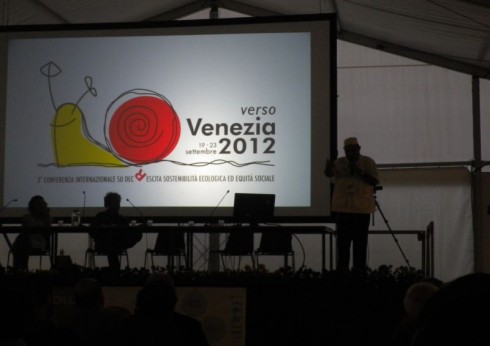
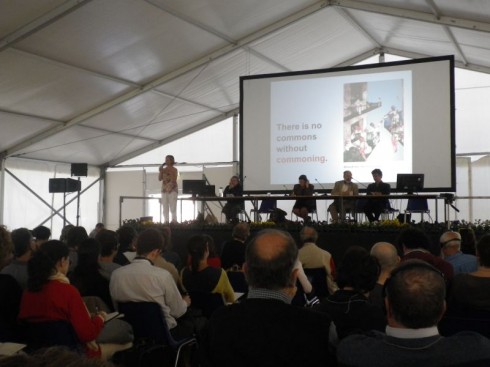
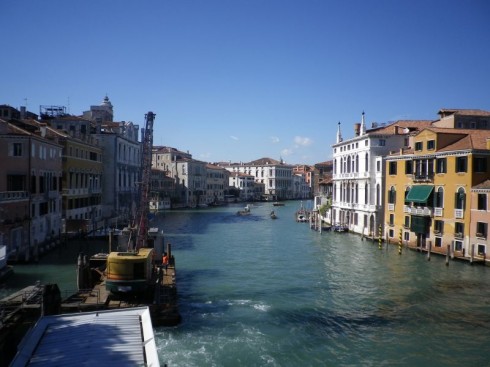
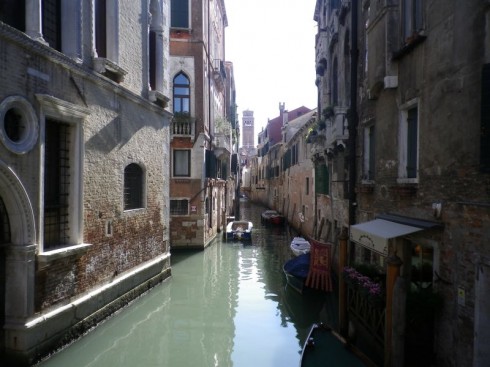
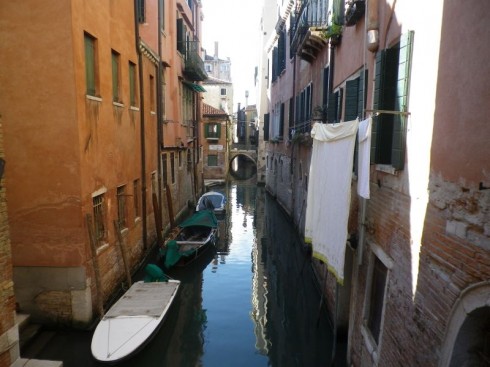
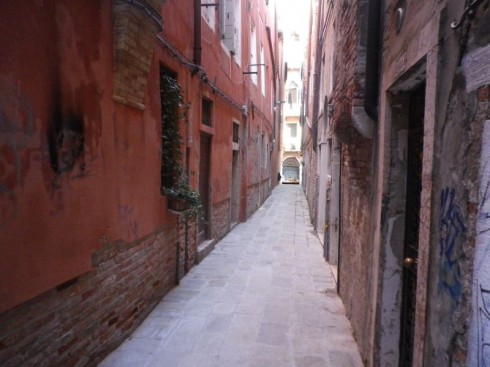
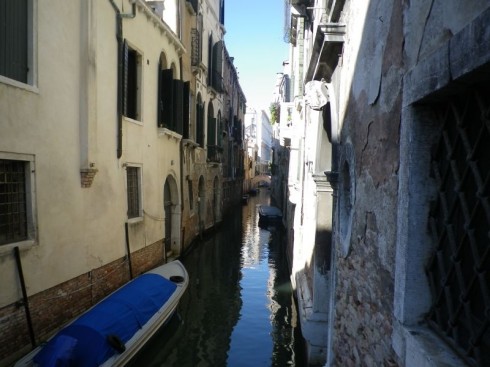
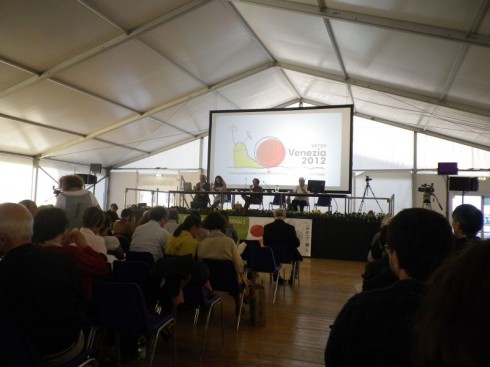
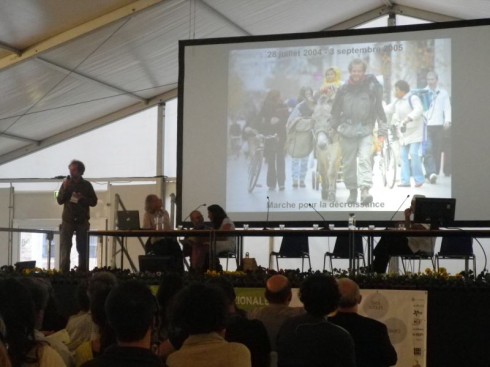
Jo Homan
21 Sep 12:54am
Not sure how relevant Javanotti il quinto mondo rap is, http://youtu.be/tAfTfzJDLp4 but the Un Altro Mondo e Possibile reference reminds me of it. Helpfully, the YouTube subtitles revealed Javanotti isn’t chanting “Dagenham! Dagenham! Dagenham!” as I had thought, but “vagano! vagano! vagano!”.
karen
21 Sep 10:02am
Touches the heart to read of the content of the conference, thanks for communicating all this so promtly. May it grow in strength
stef
21 Sep 10:21am
Thanks for your write up of the conference. I hope the irony of hosting it in Venice isn’t lost on the attendees. Its history as integral to the rise of the merchant classes can teach us a lot – which is especially poignant when you look around the crumbling beauty that is now really a museum city, with only a handful of locals left.
Neil
21 Sep 10:51am
I’m not absolutely convinced by some of the above. It depends what you mean by “commons” and “collective”. Having been to the Soviet Union in 1989 that is not the kind of society I want to live in. I don’t really want my house nationalised and within a post oil world I cannot see any point in that. I have concerns over abolishing patents and intellectual property. If someone invents something or writes a book why shouldn’t they make a reasonable return on that? Maybe I’m missing something but I don’t see where this gets us. Innovation will be vital in a post oil world and a reasonable protection for this seems important. I would like like to point out that is this written in firefox on linux and windows has been abolished in this house! So I’m not anti collective endeavour! I also think the cooperative movement will become vital with individuals forming business in local food, energy etc.
As a final point I do agree that the current system is broken and cannot survive as it is. I think I’m cautious about replacing it with one type of economy and still want a mixed one (whatever this will mean in this context). I would highlight Marcelo Baros’s comments as challenging and vital.
We’ve no idea where we are going to end up, no idea how we are going to get there, but lets have the discussion.
Laurie Graves
21 Sep 2:14pm
I am a little uncomfortable with the words “growth” and “degrowth.” Somehow, neither are nuanced enough to describe the way forward. For example, is all growth bad? What about artistic growth, spiritual growth, intellectual growth? And for desperately poor people, economic growth is not a bad thing. Then there is “degrowth,” and similar qualifiers could be used with that word. I know we need to define concepts, but we do need to take some care with this.
Neil Hollow
21 Sep 2:59pm
I’d agree with you Laurie. The government are to be congratulated on looking at “Wellbeing” (they got so much grief from their rightwing as well). I was thinking about this a bit more since my last post. In a zero growth economy we have to keep the NHS and the social security system going (being a a moderate lefty I consider them the marks of a civilised society). The Tories are trying to dismantle them for in my view ideological reasons, but since health inflation is always more than general inflation we are going to run into the buffers at some point. You can tax and tax but eventually logically you cannot increase spending any further.
Its obvious when writing the economy chapter of my book that no one even people like Herman Daly have clue what a post oil economy would look like. This was kind of mentioned on a “history of the future” programme on radio 4 at lunch time.
Silke Helfrich
21 Sep 5:59pm
Hi Rob, donẗ know how you manage to do those summaries during the conference, CONGRATULATION:
Just one thing: I am not from the Heinrich Boell Foundation, but from Commons Strategies group, this was a mistake in the programme and I hope you can correct it here.
to Neil:
What does the commons have to do with nationalization and the Soviet Union? Why do you associate the commons with nationalization? You will find nothing like that nor in the literature nor in the history of the commons.
One of the most well known slogan of the commons-debate is precisely: Commons beyond Market and State, since “the State” has been in history one of the enclosures of the commons (just as the capitalist market).
Rob Hopkins
22 Sep 8:20am
Sorry Silke! All changed. Thanks and CONGRATULATIONS back to you for managing to read it all in the midst of the conference!
Neil
22 Sep 4:35pm
Far enough its not a term I’ve heard before very much if this is the definition then I’m quite enthusiastic. http://en.wikipedia.org/wiki/The_commons